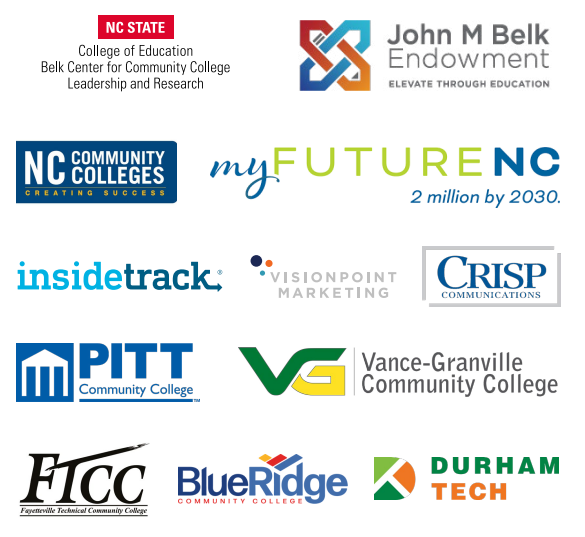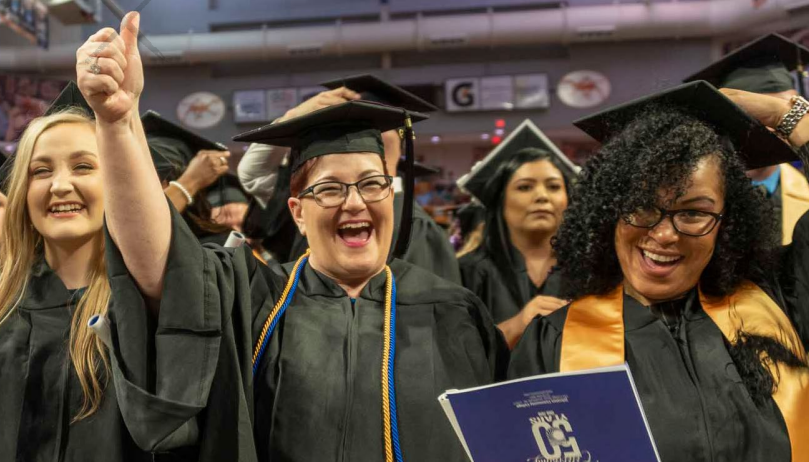
Adult Learner Guidebook
Table of contents
Supporting partners
Introduction
As in other parts of the country, North Carolina has a long-standing history of educational attainment disparities. Inequities in education in North Carolina have particularly affected adult learner populations. As of 2019, 1.3 million North Carolinian adults ages 25-44 do not have a credential or degree, and an additional 380,000 have completed some college but no degree (See Graphic 1).

To boost attainment rates, close historical gaps, and ensure North Carolina remains economically competitive, the state must ensure that two million 25-44-year-olds have completed a high-quality credential or postsecondary degree (myFutureNC, 2021).

As of 2019, 1.3 Million North Carolinian adults ages 25-44 do not have a credential or degree.
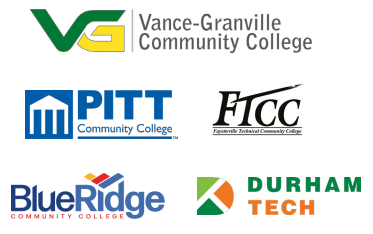
To strategize around these efforts, the John M. Belk Endowment (JMBE) launched the North Carolina Reconnect Program (NC Reconnect) in 2021 to reengage with adult learners who left college with some college credit but no degree or credential. NC Reconnect recruited five pilot colleges (See Graphic 2), including Blue Ridge Community College, Durham Technical Community College, Pitt Community College, Fayetteville Technical Community College, and Vance-Granville Community College.
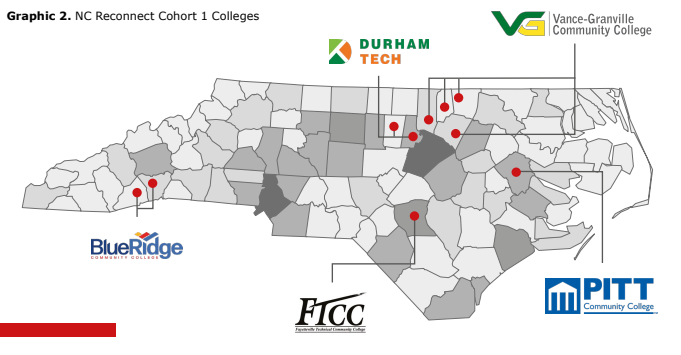
These five institutions, known as cohort one, developed and implemented strategies to reenroll adult learners in North Carolina. With support from JMBE, InsideTrack, VisionPoint Marketing, North Carolina Community College System, myFutureNC, and the Belk Center, these five institutions implemented targeted marketing and recruitment campaigns for adult learners entitled “Better Skills, Better Jobs”.
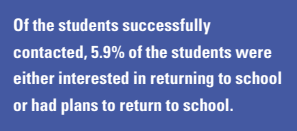
During the summer of 2021, InsideTrack reached out to 12,000 students who had previously enrolled in institutions in cohort one, but had stopped out. InsideTrack Enrollment Coaches connected with 99% of the 12,000 students and had successful contact (two-way communication) with 30% of the students. Coaches reached out to students for six weeks via phone, text, and email.
Combining various interviews and focus groups sponsored by the Belk Center, this guidebook synthesizes many lessons learned from the NC Reconnect “Better Skills, Better Jobs” campaign. Regardless of your available resources, this guidebook will help provide tangible strategies to reimagine the experiences of adult learners on your campus.

Adult learners are typically described as students who enter or return to higher education after age 24.
However, adult learners cannot be relegated to one definition. Adult learners include diverse demographics, ages, life experiences, and skill sets. Many adult learners are parents, hoping to leave a legacy for their children. Others are veterans or dislocated workers who want to refine their skills to earn better jobs or higher wages. Some are individuals who dropped out of high school or college and long to finish their credentials. At the same time, others are lifelong learners or retirees interested in trying something new, staying current, or revisiting an old hobby.
Overall, adult learners in North Carolina are not a singular group; however, with intentionality and care, institutions can create programs and initiatives with adult learners in mind. Supporting adult learners who come from various backgrounds and walks of life is equity in action.
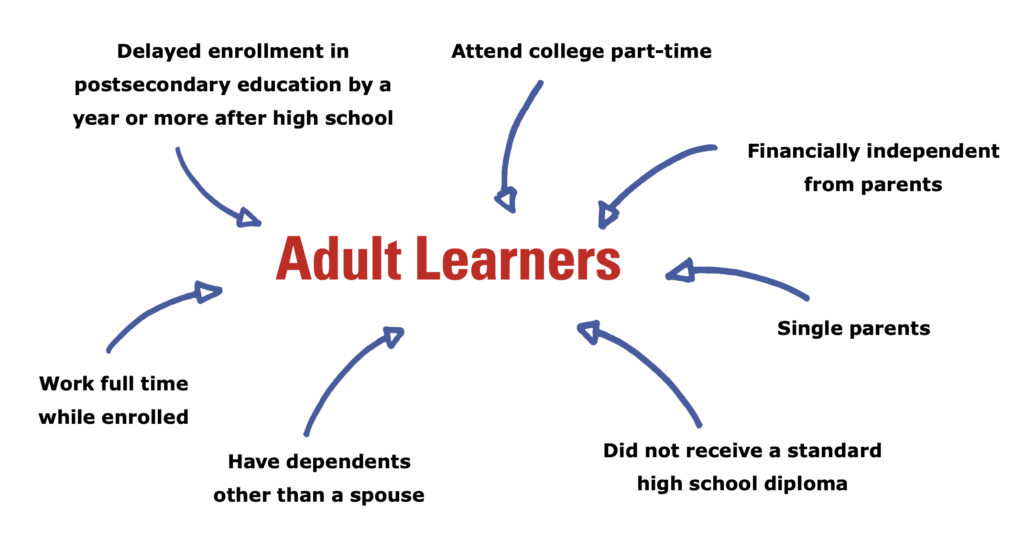
Real Lives. Real Stories. Meet Three Adult Learners
Adult learners bring both assets and challenges to college. To personalize adult learner experiences, we introduce you to three adult learners. While their names were changed to protect their identities, their stories are real.
Meet Ashley
Returning to School
Ashley is 26 years old with a three- year-old son and is enrolled in the basic building construction training program at a NC community college. She wants to “become her own boss one day.”
When asked why she was returning, she shared, “To cancel the poor curse. I grew up poor, so poor. I want to change that. I want to give my son what I didn’t have. Taking classes is a stepping stone to building generational wealth.”
Career Goals
At her NC community college, Ashley is learning various skills in the construction trades. From plumbing to HVAC to forklift training and welding, Ashley learns knowledge and technical skills that can lead to employment opportunities.
Challenges
Ashley’s car recently stopped working, making it difficult for her to find reliable and timely transportation. While her city has a bus system, both staff and students shared the local transit can be challenging to navigate — alluding to the hour or two hours you have to spend on the bus before arriving on campus.
And, for a single mom, two hours one-way on a bus isn’t always an option. But Ashley is determined and says she will find a way to class no matter what.
Ashley shared, “I want to do what I need to do to get me out of my predicament.”
Meet Alexis
Returning to School
Alexis did not finish high school, but a text message helped her overcome her fear and come back to school.
“A text message in this day and age is quite wonderful because I work all day Monday-Friday.” After applying, Alexis was contacted “within 24 hours” and got the ball rolling. Now, she is in her third semester at a NC community college and is president of a student organization.
Alexis’s decision to return to school came after her father’s death. She wants to make him proud.
Career Goals
“I want to be a helper,” so Alexis enrolled in the human services program at her local NC community college.
Challenges
Even though her father’s death pushed her forward, Alexis noted there is always some fear and apprehension about returning to school as an adult. Questions come up like, “Am I going to do well? Am I smart enough?” She also mentioned an internal clock inside telling her she needed to hurry and finish.
“But you can’t let fear run your life…It took me six years to get back into school. I was a high school dropout.”
When asked what advice she had for adults who were deciding whether they should return to school, Alexis shared, “Just do it.”
Meet Kevin
Returning to School
Kevin had “some college, no degree” because something always happened which would eventually force him to leave without finishing his degree. Years later, Kevin wasn’t happy with his career and wanted to make a change, but when COVID hit, he had trouble finding a new job. During that time, he started doing a lot of self-reflection and knew going back to college was the right decision.
Career Goals
Describing himself as a “computer geek,” Kevin signed up for his local community college’s information technology program to engage in the work that he loved.
Challenges
Kevin can only attend online classes. He shared, “There is no way I could come to class every day.” As an older adult, Kevin mentioned the flexibility with online classes has been crucial to his success.
Kevin described hesitancy to return to school, but expressed gratitude and mentioned that the decision to pursue a credential was a good one. “Remember, you can always find a reason not to do something,” said Kevin.
Across these three profiles, it is evident that adult learners manage commitments, finances, and life’s various circumstances; yet, they have the assets and abilities to succeed at colleges built with their success in mind. Representing 40% of higher education’s student population, adult learners present an opportunity to create a more educated workforce to meet the needs of the coming decades, particularly in the state of North Carolina (Nichols & Barber, 2021).
Key Learnings and Opportunities
Across the NC Reconnect program, we gleaned several takeaways from the first cohort.
To frame the conversation, we use the analogy of on-ramps and off-ramps to help visualize the journey of adult learners. Using this analogy, we highlight some of the obstacles or “roadblocks‟ that may try to derail the success of adult students.
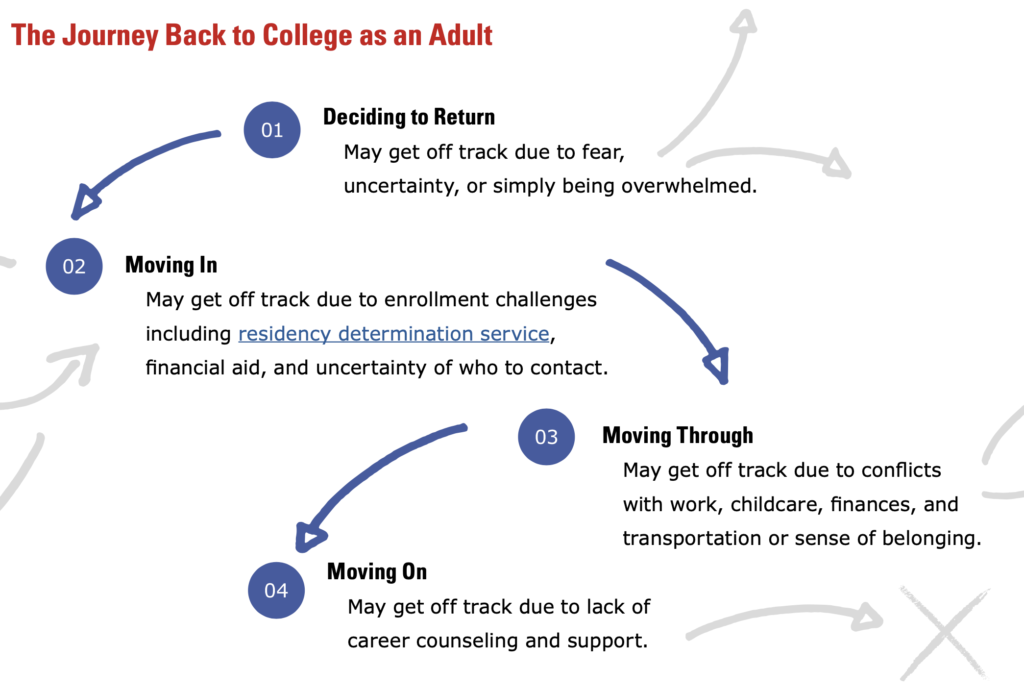
01. Deciding to Return
When deciding to attend or return to college, adult learners need easily accessible on-ramps to get started. Customized marketing and outreach events targeted to adults can help get adults to reenroll. Due to fear and uncertainty around enrolling or going to college, adult learners need to feel as if returning to college makes sense.
Example 1: Institutions like Pitt Community College created a job fair on campus to recruit adult learners. As students visited the campus to seek out better jobs, Pitt Community College staff were available to answer questions about credentials and degree requirements.
We partnered with our local economic development agencies, major employers, as well as the university to host a ‘Better Skills, Better Jobs’ job fair. We had over 600 individuals attend, focusing mainly on adult learners. The key behind this effort is not only to say that there are jobs available out here, but that we also have the resources to help you get those jobs.
– Dr. Lawrence Rouse, Pitt Community College President
Example 2: Institutions like Blue Ridge Community College advertised free college in their marketing.
Adults considering higher education always ask two questions:
‘How long is it going to take?’ and ‘how much will it cost?’ To truly meet their needs, we must be ready to present a financial package while answering these questions. In considering a path toward free college for all students, I met with our CFO and ran a projection.We combined 14 sources of funding and assumed a 10% increase in enrollment. We were thrilled when the numbers added up, proving it was possible. We then prepared our messaging with the marketing team and shared the good news with the community. It worked. Our spring early indicators showed that we were up 13% in enrollment with 70% of them full-time equivalent students. We’re confident that this success was the result of combining our messages for free college and adult engagement.
– Dr. Laura Leatherwood, Blue Ridge Community College President
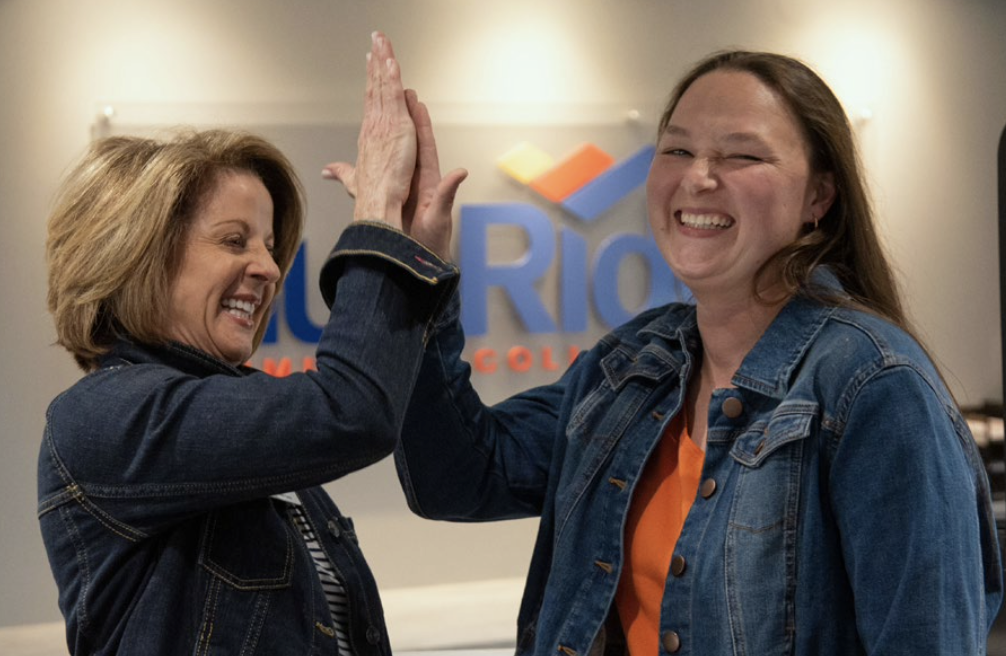
Further, in our interviews, students expressed not wanting to “waste any time.” Institutions should be prepared to share clear credential/ degree pathways, advising, and career counseling for adults who want to move quickly through the process to land their next career.
Roadblocks
When deciding to return, adult learners may face many emotions, including:
- fear of failure;
- apprehension around returning to a new campus environment;
- nervousness about wasting time; and
- feelings of selfishness for focusing on themselves instead of their families.
Institutions should try to be proactive in addressing these roadblocks via marketing materials, emails, and conversations before learners arrive, so adults know that these concerns are a normal part of the return process.
02. Moving Into Community College
Once adults decide to enroll, there are many factors (e.g., apprehension and uncertainty) that can try to derail them. Adult learners need a person or a one-stop-shop to take care of their financial aid, course selection, and life emergencies that may try to inhibit their success. Working collaboratively across the institution and with community partners and families, campuses must get rid of any unnecessary roadblocks that may prevent adult students from successfully onboarding to college. Any small inconveniences could be detrimental to student success.
Example 1: Institutions like Pitt and Fayetteville community colleges are adopting Adult Learner Centers on their campuses. These one-stop-shops will be equipped with highly engaged advisors who ask questions about the whole student (e.g., family concerns, academic goals, employment goals, etc.). Additionally, this campus resource is a hands- on space to answer student questions about the enrollment process.
We decided to create an Adult Learner Center. We know adult learners face barriers that maybe other students do not, so we don‘t treat them all the same. Students can get information from the Adult Learner Center not only about the institution but also about available services we may be able to provide or community partners who can support things like transportation, daycare, food insecurity, and other wraparound needs. We have made a significant shift in the way we enroll students so that once our students arrive on campus, we are able to serve them in a more cohesive manner.
– Dr. Lawrence Rouse, Pitt Community College President
Example 2: Some campuses made the financial decision to pay staff to work with adult learners over winter break.
We realized that by closing December 22nd and reopening on January 2nd, our enrollment specialists and support members in admissions, records, and registration were missing the opportunity to engage many potential students—especially from the adult learner population. So we pulled funding together, creating the opportunity for our team members who wanted to work and earn additional income while serving prospective students during a critical time. We changed our message to say we are here and waiting to talk to you. Because of this effort, we had about 175 students enroll during that period. It was a small expense for a big return that also created a culture shift for what’s important to us.
– J.B. Buxton, Durham Technical Community College President
Example 3: Durham Tech also took the lead on providing intrusive advising and career counseling early on in the enrollment process to ensure students were maximizing their time and effort.
I would strongly advocate for a career assessment tool and pathway. So many of our students are coming to us because they saw the application online and went through that career assessment process. But we are focusing now more than ever on short-term and long-term credentialing. We are having conversations with students about their ability to meet the commitment for long-term academic goals and offering a short-term credential pathway when it may be a better fit—thanks in large part to our highly trained staff who understand all that we have to offer our students.
– Abraham Dones, Durham Technical Community College Vice President and Chief Student Services Officer

Roadblocks
When moving into college, adult learners may experience anxiety around choosing the wrong career pathway or fear of not receiving a return on investment.
Additionally, adults may be nervous about completing documentation like the Free Application for Federal Student Aid (FAFSA) or overwhelmed by the number of staff with which they must connect to complete the enrollment process. Institutions in cohort one attended to these roadblocks by putting key players (e.g., success coaches) and resources (adult learner centers) in place to provide step-by-step support.
We called this the “hold their hands method” with the understanding that adult learners need a person or an office to walk with them and hold their hands. While there is often a negative connotation to holding their hands, every student can benefit from seamless support, especially adult learners.
03. Moving Through Community College
To help students find their rhythm and make progress on the road to success, adult learners need flexible classes including in-person, hybrid, and fully online class options. Having flexible options helps adults juggle busy schedules while moving forward in their studies. Additionally, adult learners want faculty who understand their experiences and need for flexible deadlines and increased support. Further, institutions should support adult learners and work collaboratively with community partners to provide childcare, transportation, and stable internet broadband.
Example 1: Fayetteville Tech is providing flexible classroom spaces for adult learners to take both virtual and in-person courses.
We are building the ability to offer classes that allow students maximum flexibility about how they attend. We‘re putting in 16 labs across campus for high-flex learning. What is high-flex learning? It‘s high-quality face-to-face learning, but you can attend classes virtually synchronously or virtually asynchronously. We’re making it easy and providing spaces for students to study at their own schedule—no matter what time they work or when they may have childcare.
– Dr. J. Larry Keen, Fayetteville Technical Community College President
Example 2: Vance-Granville Community College provides shorter semester classes so that students can finish a program more quickly and have more financial aid eligibility.
We‘re transitioning to a predominantly eight-week term. We all know that adult learners, they want to get in and they want to get out. We believe this change will accelerate short-term opportunities and better serve the adult learner population.
– Dr. Rachel Desmarais, Vance-Granville Community College President
Example 3: Fayetteville Tech collaborates with community partners to help fix a transportation issue.
In partnership with the city of Fayetteville, we were able to arrange bus tokens for our students who did not have transportation to campus. We had the good fortune of working with community partners to remove different barriers for our students.
– Dr. J. Larry Keen, Fayetteville Technical Community College President
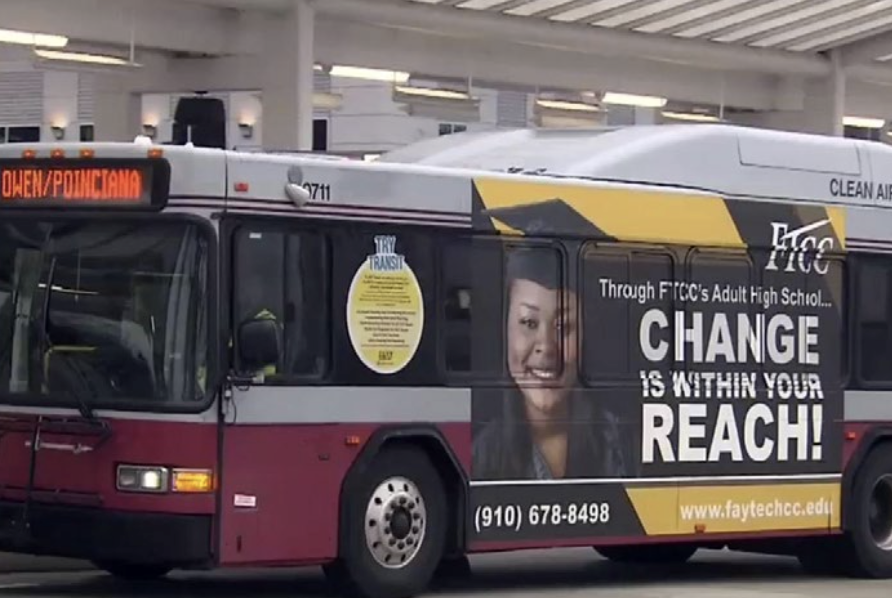
Roadblocks
In moving through college, students face the roadblocks of unreliable internet access, difficulty navigating online courses, and life emergencies (e.g., transportation, childcare, homelessness, housing insecurity, unemployment, etc.), all of which can force adult learners off track.
04. Moving On
Adult learners need career counseling, work-based learning opportunities, and ample support throughout their journeys to move into high-quality career opportunities. While these resources should be available during the entire student journey, adults need support from on-campus and community partners to successfully “off-ramp“ or matriculate into the workforce.
Example 1: Institutions like Pitt Community College offer resources from their Career Center—which include intrusive advising, connection with local employers, and resume reviews. These opportunities are available to all adult learners throughout their matriculation and beyond.
Example 2: Fayetteville Technical Community College met with external partners and employers.
We created an advisory committee of local employers to understand their needs and how we can better support and prepare students for future careers. We also went to connectors in the community. For example, we are working with the local Housing Authority to train residents in property maintenance, so that the Housing Authority can employ their residents to help repair and maintain those properties. And those individuals are learning workforce skills while becoming a leader in their community and earning an income.
– Dr. Mark Sorrells, Fayetteville Technical Community College Senior Vice President of Academic and Student Services
Roadblocks
When moving on from their institutions, adult learners may not have access to work-based learning opportunities or internships while in school due to busy schedules and therefore, they may not get connected to employers to showcase their skills and secure a meaningful job. Additionally, adult learners may feel like their geographic location is a hindrance to landing their dream job. Finally, adults may not be aware of all the available resources on campus to help them find work. With all these roadblocks in mind, institutions should find ways to overcome these barriers.
Lessons from Leadership
Intentional Strategies from Campus Presidents
Community college leaders designated to lead adult learner efforts have
an immense responsibility and potential to change the trajectories of individuals and communities. Though this work will not be accomplished by any single individual, the following strategies can support campus leaders in moving adult learner work forward.
Embrace a Culture Shift
For some institutions, pivoting to focus on adult learners may be a shift in institutional culture. Although community colleges have supported adult learners since their inception, efforts such as dual enrollment have shifted attention away from this population. Campus leaders should embrace the work and refocus campus attention on adult learners. These culture shifts could be a significant change for some faculty and staff and thus, like any change effort, leaders must be aware of how to successfully lead new (or renewed) efforts through change management strategies.
Example: As Durham Technical Community College (Durham Tech) embarked
on a new strategic plan, focusing on adult learners was essential. Durham Tech began a culture shift by revisiting its mission to ensure equity and inclusion. The college became sharply focused on preparing students for work and economic development. A goal supporting the college‘s mission was set to a measurable job placement rate and wage earnings for students. An expectation was set for the college to become student-ready vs. the students becoming ready for college.
Communicate Clearly and Often
Many of the strategies contributing to the success of adult learners focus on clear, effective communication. Explain the “why” to staff, faculty, and administrators – why this adult learner focus is important now and how the strategies may be different from previous work with traditional-age students.
Talk to faculty and staff regularly about efforts to engage adult learners. Highlight quantitative and qualitative data, adult learner programs, and assessments – along with degree and non-degree programs. Consistent communication will help prioritize expectations for all stakeholders.
Example: Blue Ridge Community College president communicated with her team each Monday.
To use a sports analogy, every player on the team needs to know the score. Every Monday, I share the data with my staff on our performance in reaching adult learners. I continually ask them, ‘what do you need to be successful?’ Then I find the resources to meet those needs. As leaders, we have to drive results for our team members, and in turn, they drive results for the institution and our community.
– Dr. Laura Leatherwood, Blue Ridge Community College President
Identify a Project Manager or Adult Learner Champion
Presidents need a point person to lead these efforts and troubleshoot concerns when they arise. The point person must have skills to engage with internal and external stakeholders and must be deeply committed to the success of adult learners.
Example: At Pitt Community College, Dr. Lawrence Rouse identified Dr. Johnny Smith, VP of Strategic Initiatives and Community Engagement, as Pitt’s point person for the project. Identifying one point person or one committee can help institutions keep tabs on data updates, student experiences, and any leaks in the adult learner pipeline.
You need to have a lieutenant who cares about these things…I think a college the size of Pitt and everything that I‘m doing as a president, and just daily operations, and just so many things from different sides, I didn‘t want anything to fall through the cracks. So I empowered Johnny to kind of be that person out there rallying the campus.
– Dr. Lawrence Rouse, Pitt Community College President
Dig into Adult Learner and Community Data
Connect with your institutional research teams to look at data about adult learners and community challenges. Engage in this practice often. Disagregatting data will create a sense of urgency and the entire campus needs to be engaged. In-depth dives into adult learner data around enrollment, persistence, and completion will provide background to inform continuous improvement in these areas.
Example 1: Vance-Granville Community College shared how the use of data was essential to moving this work forward. For Dr. Rachel Desmarais and the Vance-Granville team, it was important to use the data as a way to look at the success of the college’s adult learner efforts and next steps. By sharing visuals of adult learner data institution-wide, Dr. Desmarais guided colleagues to take a moment to understand the stories behind the data. She encouraged the team to ask questions to build their knowledge. Additionally, Vance-Granville shifted their perception of data to one that inspires and motivates the institution to do things differently for adult learners.
Example 2: Blue Ridge Community College’s president completed an environmental scan, looking at her community data to gain context on what was needed.
As the pandemic continued, we started seeing some very concerning trends in the data. People in our community were out of work. Others were leaving work and not returning. High school students were disengaging from their virtual instruction. Unless we acted quickly, this would significantly affect our college enrollment, the health of our workforce, and the viability of area employers. This high-level environmental scan was critical in helping us prepare for the future.
– Dr. Laura Leatherwood, Blue Ridge Community College President
Assess Adult Learners
Encourage adult learners to share how their life characteristics impact their learning. Invite faculty and student services staff to assess adult learners‘ experiences during their matriculation and post- graduation (e.g., exit survey). Review adult learner data and use data to eliminate barriers to success.
Example 1: At Durham Tech, campus support staff meet with adult learners to learn about concerns related to childcare and work.
Example 2: Fayetteville Tech follows their graduates, including adult learners, to track their success:
Each year we do a person-by-person review. It‘s not pristine but it‘s the best we have in following our graduates to see where they are and then to know how many are doing well, have they believed in what they learned, [have] they applied [it] on the job or wherever they transferred to…We have a statistic we can come back with.
– Dr. J. Larry Keen, Fayetteville Technical Community College President
Talk to Those Who Serve Adult Learners
Find ways to learn from those on your campus and in your community who already work with adult learners and let their expertise inform this initiative. Build on what’s working that staff and faculty have already been doing by acknowledging and highlighting their work.
Ask these individuals what could be improved and adjust strategies as needed.
Example: Fayetteville Technical Community College contributes much of their program success to those who serve adult learners:
Identify people that really have a passion for what they‘re doing, in those certain categories, align with them. Give them the resources and the ability and the support to do what they‘re supposed to do and get out of the way and let them do the jobs they‘re supposed to do. And hold them accountable.
– Dr. J. Larry Keen, Fayetteville Technical Community College President
Communication Strategies
Community colleges in the NC Reconnect program had access to InsideTrack and VisionPoint Marketing to maximize their communication and marketing campaigns and attract adult learners. However, all institutions may not have the resources to hire a marketing firm.
Based on data across all five pilot schools, there are 10 promising practices to build a successful marketing campaign to attract adult learners:
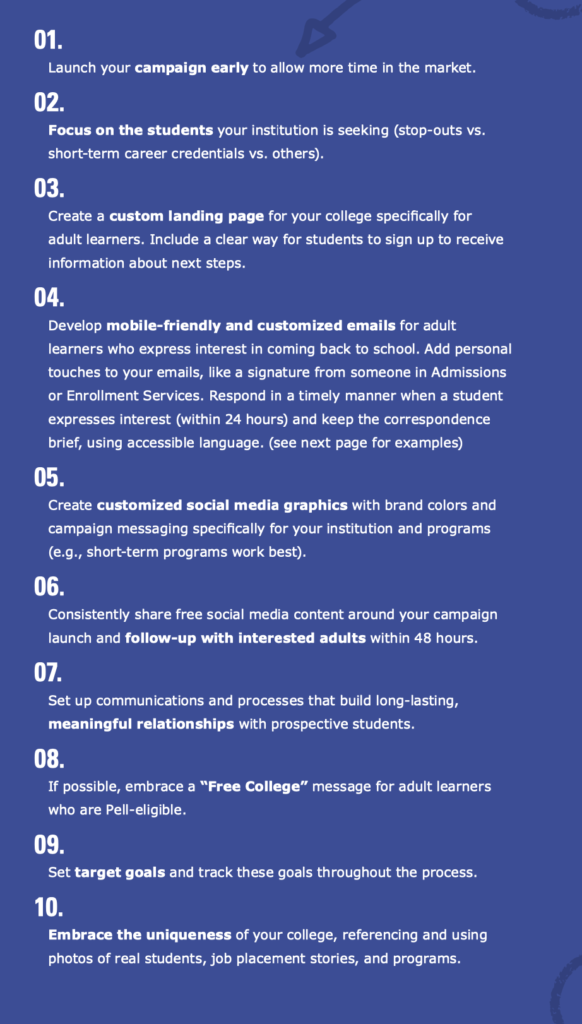
Using Email Intentionally
It is important to utilize a variety of mobile-friendly communication strategies when marketing to adult learners. Email is an affordable marketing method that allows the college to connect with prospective students in a personalized way.
Using secret shopper methods, VisionPoint Marketing collected data on email communication from cohort one to measure potential for engagement based on emails sent to prospective students. Below are sample email templates loosely adapted from Durham Tech and Pitt Community Colleges that demonstrate promising practices when using email.
| Durham Tech | Hello Tom, Thank you for expressing interest in [institution name and specific program at institution]. We are excited you have contacted us. Our fall 2022 semester starts in less than three weeks on August 29, 2022. The next step will be to connect with you to discuss your interests and how we can support your career and educational goals. We can be reached at (000)000-0000 between 8am-8pm Monday-Saturday, or at admissions@institution.com. We look forward to hearing back from you. Sincerely, [Staff member name] |
| Pitt Community College | Good afternoon Tom, My name is [staff member name], and I am the [job title here] at [institution name]. Thank you so much for completing an interest form to learn more about [institution abbreviation] and the programs we provide to help you get educated and empowered for success! I’d enjoy the opportunity to learn more about you and your personal/professional goals. As an adult learner, I’m happy to be your point of contact to navigate our admissions process, get connected to financial support to help pay for college, and introduce you to the educational pathway you’re looking for. For some background, will this be your first time attending [institution name] or any other college? Do you have an intended major in mind? I’m happy to discuss over the phone at (000)000- 0000, or you can contact me by email at admissions@institution.com. I look forward to hearing back from you. Sincerely, [Staff member name] |
Considering Social Media Strategies
Social media can be a valuable marketing tool for adult learners when used effectively. Using diverse photos of your own students on social media platforms offers a personal connection to the institution. Adult learners are more likely to relate to individuals who look like them. Using real students engaging in work specifically related to an attainable credential was more successful than photos of campus buildings.
Successful campaigns highlighted specific programs that prepare students to enter a job in the area with a family sustainable living wage. Colleges using short phrases that grabbed the attention of adult learners had more success, including “Free College” or “Earn a degree in 6 months”.
Below are several examples of some of the highest-performing social ads from the adult learner campaign.
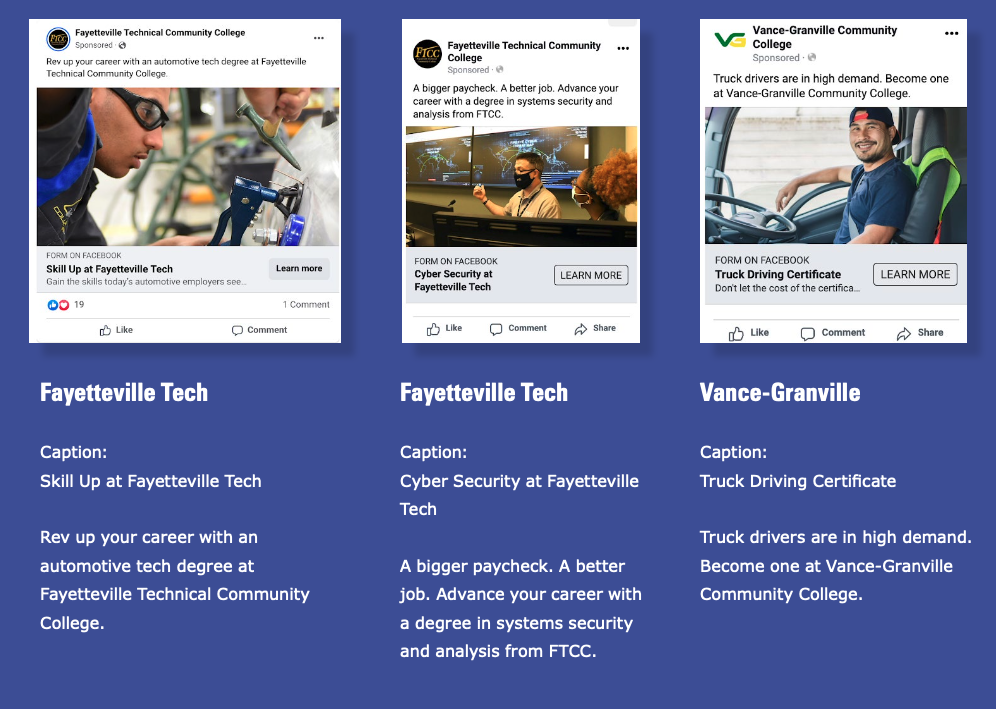
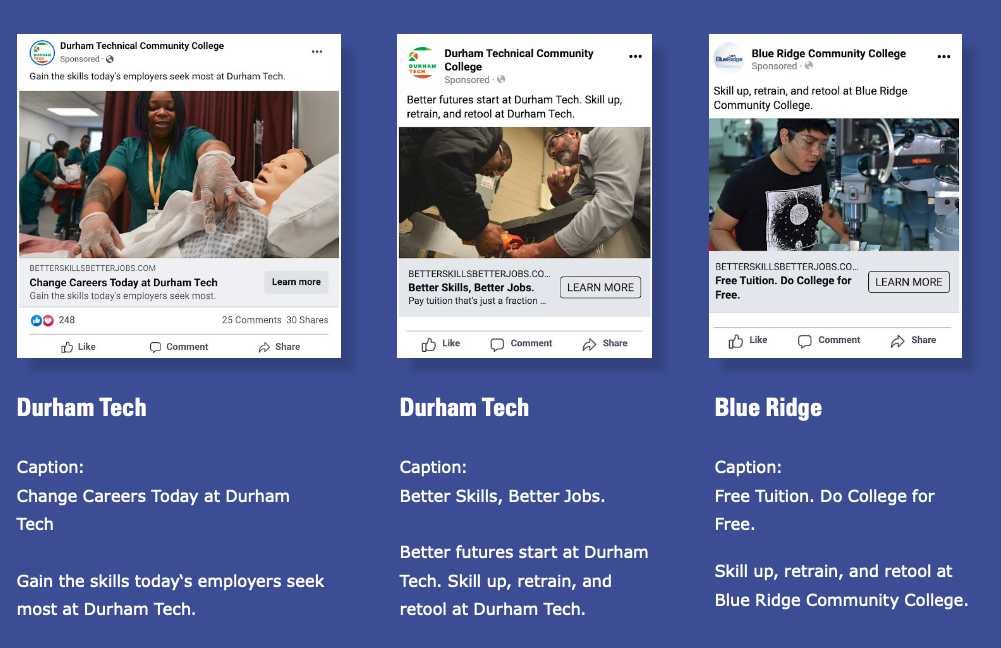
Faculty Insights
Classroom spaces should be inclusive of all students, particularly adult learners. Faculty members at one institution shared insights on practical strategies for working with adult learners in virtual and in-person classes. Intentional messaging from the campus president, department heads, and colleagues, helped faculty be strategic about policies and practices which might hinder student success.
Allow adult learners to work ahead
Allow adult learners the opportunity to work ahead.
Students who identify as adult learners need ample time to access Learning Management Systems (e.g., Moodle, Blackboard, Canvas) and they need opportunities to work ahead on course assignments.
Example: Faculty should make courses, assignments, and tests available as early as possible for those who want to move strategically through course materials.
Over Communicate
Over-communicate with adult learners about assignment due dates and class expectations.
For adults, the identity of a student is not always salient, particularly if other identities take priority (e.g., parent, employee, caregiver). Knowing that adult learners are juggling work and home, faculty should over-communicate with adults and provide learners with ample time and space to ask questions and receive support.
Example: Faculty members shared having virtual office hours for students each week to answer any immediate and urgent questions. These intentional office hours helped cut down on excessive emails and helped faculty build rapport with students. Faculty also shared having space in Moodle or Blackboard for the class to answer one another’s questions. Instructors shared learners appreciate having a virtual community to support them through assignments instead of traversing through their courses alone.
Be aware of resources
Be aware of resources both on and off-campus.
Faculty shared the importance of working collaboratively with student services and their local communities to help adult learners experiencing a personal crisis (e.g., mental health concerns, homelessness, illness, job loss). As first responders to student emergencies, faculty should know how to communicate with student services.
Example: At one of the pilot institutions, faculty were knowledgeable about communicating student concerns via the AVISO Retention software platform. Adding student notes in AVISO allowed several faculty members to quickly speak across the institution to success coaches, academic advisors, and student services members, creating a safety net to prevent adult learners from falling through the cracks.
Keep care at the center
Keep care at the “center of the work.”
For many faculty, the COVID-19 pandemic brought opportunities to shift classroom curricula and virtual opportunities for all, particularly adult learners. Creating flexible course and assignment options during COVID-19 allowed faculty the opportunity to explore new ways to care for students.
Example: Faculty mentioned giving grace to adult learners. Grace for adult learners looked like providing flexibility on assignment deadlines, inviting students to work collaboratively on assignments, creating hybrid courses for students to work online and in-person, and allowing paper submissions on coursework if students do not have access to the internet.
Professional Learning for Faculty and Staff
Adult learners are a unique population that require individualized support and attention. They often work full-time or part-time, are parents or caregivers, and carry responsibilities that students directly out of high school may not have. Many staff, faculty, and administrators choose to participate in professional learning opportunities to learn how to support and accommodate adult learners. Additionally, staff who work in marketing and communications may seek professional development to learn how to best conduct outreach to adult learners. Working with a professional marketing firm (e.g. VisionPoint Marketing or Crisp Communications) could prove beneficial in recruiting adult learners to your college.
The Belk Center for Community College Leadership and Research
The Belk Center is committed to supporting colleges in their quest to learn about their adult students. The Belk Center and EdNC continue to support efforts to learn about the challenges and opportunities facing adult learners. The Belk Center, along with the Student Success Center and Achieving the Dream, are building Teaching and Learning Hubs across the state. These Hubs can provide vital support to faculty and staff educators working with adult learners.
InsideTrack
InsideTrack is a mission-driven nonprofit passionate about helping all learners achieve their education and career goals through the transformative power of coaching. They partner with institutions through both direct coaching support, as well as capacity building through staff training and coaching certifications that sustain advances in-house for lasting, scalable impact. Since 2001, InsideTrack has served 2.6 million learners, partnering with more than 250 institutions and organizations to directly improve enrollment, persistence, completion and career readiness.
North Carolina Community College System
The NC Community College System offers the REACH Collaborative, which focuses on transforming credential pathways to associate degrees at community colleges to improve credential attainment and economic mobility for adult learners of color. Twenty-four colleges are participating in the project. In addition, the North Carolina Student Success Center (NCSSC) offers a variety of workshops which are relevant for faculty and staff that wish to better support adult learners. Workshops can be found here. Additional workshops can be found in the NCCCS Academic Programs calendar of events, found here.
The Council for Adult and Experiential Learning (CAEL)
To promote professional development opportunities for our stakeholders, CAEL offers a variety of self-paced and live, online learning experiences.
Webinars & Microcourses
- Roadmaps to Success: Understanding and serving your adult learners
- Engaging Adult Learners as Consumers
- Attracting Adults to Your Institution
- Designing Stackable Credentials
- Embedding Experiential Learning in Your Programs
Instructor-Led Trainings
Conferences
Advice from Cohort One
Thank about your Institutional Context
…each institution is different. So whatever you come up with within the parameters you want to modify to fit your institution as well as the demographics that you serve. And I think that‘s the way that you‘ll be more successful. The only thing I will also say is that also allow some input from your faculty and staff but let‘s not get stuck in, “This is the way we‘ve always done it,“ but to say, “How can we make this happen, how can we be successful with it,“ and then move forward from there.
[Durham Tech]
Be Intentional and Strategic
…if you decide to take this on…make this a priority, and let it come from the president that this is important, but not only just because the president says so but because of the population that we serve and we want to make sure that we engage them. So I think your leadership team [must] drill down that this is an important priority for your institution.
[Pitt Community College]
Use Data and Communicate
Don’t be afraid to roll up your sleeves and dive into the data. Every Monday morning, I now look at the numbers. I look at our key performance indicators, like the number of applications and FAFSA forms we’re receiving. This helps me see the results of our work and any concerns on the horizon. It also allows us to make “real time” adjustments in our work.
[Blue Ridge Community College]
Make Sure your Teams are Cross Trained
If you have a single individual that holds all the knowledge and skills to perform a certain function you are setting the stage for the work of the college to stall. Given the fact we just emerged from a pandemic, redundancy in our work and having everyone cross-trained became more important than ever. This is important no matter the size of the college.
[Blue Ridge Community College]
Align Work with your Strategic Plan
The importance of connecting this into mission and strategic focus and not running the risk that anyone would see this as a kind of new initiative or beta test that‘s going to start and end or some grant money is going to run out and you don‘t do it anymore. So I think that‘s really important from the outset.
[Durham Tech]
Question Everything
…question everything and listen to who‘s not coming. Question why do we do what we do? Not just because it‘s always been done at our individual college, but I would say, question everything to the point of the way education works. Why are we doing this? Because a lot of us don‘t realize we‘re following a university four-year college model in many cases that doesn‘t always make sense for us, particularly the adult learner. [Vance-Granville Community College]
…don‘t get so aligned with old systems that you fail to see what is possible in the future. All of us operate in cultures, and those cultures, if you‘re not careful, can come to the point where they make you unable to move forward and to do things that are creative and innovative. [Fayetteville Technical Community College]
…we’re using the current circumstances as an opportunity to transform what we do every day, right now, and right here in the present. [Blue Ridge Community College]
A Call to Action
To begin thinking about how to move forward, the following questions are for consideration.
How each institution approaches these questions will depend on institutional context.
- How does your current campus culture and climate support the work necessary to reengage adult learners?
- What are the strengths of the college?
- What are opportunities for growth?
- Based on what you have read in this guidebook, what are 2-3 small changes your institution could make to have an impact on your campus?
- Where can the talent of current employees be shifted to enhance this work?
- Looking at your institution‘s data, what adult learner subpopulations still need to be supported? (e.g., veterans, parents, underrepresented minorities, etc.)
- Thinking about your institution, what external partners (employers, state agencies, and resources) could be leveraged to help you?
About the Belk Center
About the Belk Center
The Belk Center for Community College Leadership and Research at North Carolina State University develops and sustains exceptional community college leaders who are committed to advancing equitable college access and student success, the social and economic mobility of their colleges’ students, and the economic competitiveness of their regions. The Center provides professional development and research related to current and emerging student success opportunities and challenges facing community college leaders and policymakers in North Carolina and the nation.
The Team
- Roshaunda Breeden, Ph.D. – Senior Research Associate
- Emily VanZoest, M.A. – Research Associate
- Micara Lewis Sessoms, Ed.D. – Research Affiliate
- Dion Harry, M.Ed. – Research Associate
- Erin Meachum Lewis, M.A. – Research Affiliate
- Holley Nichols, Ph.D. – Associate Director of Research and Evaluation
- Audrey J. Jaeger, Ph.D. – Executive Director
- Emily Thomas, M.A. – Policy Analyst
